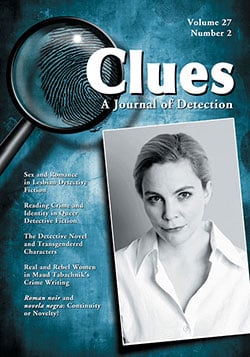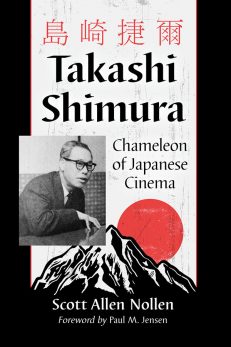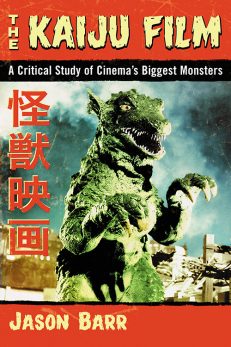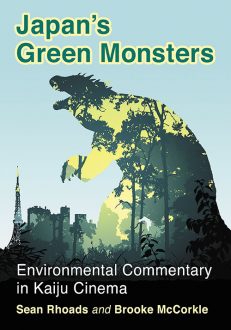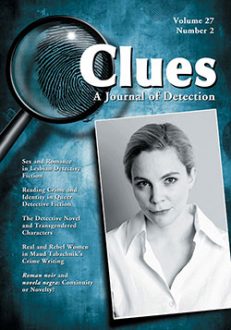Clues: A Journal of Detection, Vol. 27, No. 2 (Fall 2009)
Print Back Issue$30.00
In stock
About the Book
BACK ISSUE
This is a single back issue only. To order a current subscription, or for more information, please visit the journal’s web page at CluesJournal.com. Back issues from earlier volumes of Clues are available for order subject to availability. Also, single issues of the current volume may be ordered one at a time. Individuals may order back issues directly from our online catalog, and the charge for individuals is $30 (excluding postage). Issues from Volume 33 to the present are also available in ebook format on Kindle, Nook and Google Play.
The charge for single issues for institutions is $75 per issue (excluding postage). If your institution requires a back issue, please contact us to order at the appropriate rate.
About the Author(s)
Bibliographic Details
Executive Editor Margaret Kinsman
Managing Editor Elizabeth Foxwell
Format: softcover (7 x 10), back issue
Pages: 122
Bibliographic Info:
Copyright Date: 2009
ISSN 0742-4248
Imprint: McFarland
Table of Contents
Theme Issue: Lesbian Crime Fiction
Guest Editor: Jacky Collins
Introduction
JACKY COLLINS 5
Torn between Two Genres: Sex and Romance in Lesbian Detective Fiction
INGA SIMPSON 9
Lesbian detective fiction’s radical origins took the mystery genre to the extreme
of the rape of the detective. More contemporary works foreground lesbian sex,
romance, and identity. As a result, lesbian detective fiction has not continued to
develop and failed to engage a wider audience. The author’s analysis includes
works by M. F. Beal, Stella Duffy, Katherine V. Forrest, Clare McNab, Barbara
Wilson, and Eve Zaremba.
Re-covered Bodies: The Detective Novel and Transgendered Characters
PHYLLIS M. BETZ 21
Lesbian detective texts are especially adept at integrating characters and issues
that reflect adaptations of social relationships. The author examines how the
issues surrounding transgender are not only represented in the text as part of
the conventional narrative structure but also how constructions of gender are
reconceptualized for transgendered characters, how these characters respond,
and what the representations mean for the reader. Included in the analysis are
works by Katherine V. Forrest, Jane DiLucchio, Penny Mickelbury, Radclyffe,
and Shelley Smith.
Of Herrings Red and Lavender: Reading Crime and Identity in Queer Detective Fiction
FAYE STEWART 33
Why study queer detective novels? This question is answered through an
examination of the similarities between the tasks of solving crime and decoding
sexual identity. Diverse modes of code reading employed in detective narratives
are untangled, exposing their structural relationships to the investigative
work of interpreting and categorizing ambiguous sexualities. The author’s
analysis includes Thea Dorn’s Berliner Aufklärung (Berlin Enlightenment, 1994).
Real and Rebel Women in Maud Tabachnik’s Crime Writing
MARINA LÓPEZ MARTÍNEZ 45
The author draws on Jean-Paul Sartre’s concept of the Other and Julia Kristeva’s
theory of rebellion to analyze several Maud Tabachnik works, in particular
those featuring her lesbian heroine Sandra Khan. Tabachnik employs the trope
of the lesbian amateur detective to investigate the diverse manifestations of
oppression that she believes is responsible for much political and social conflict.
Roman noir and novela negra: Continuity or Novelty?
NICOLE DÉCURÉ 55
There is no such thing as “the lesbian crime novel” in France and Spain. The two
examples discussed here, the fiction of Maud Tabachnik and Lola Van Guardia
(aka Isabel Franc), offer very different approaches to crime fiction featuring
lesbians. In the former, lesbianism is just a fact of life; the latter depicts a world with only lesbians.
Isabel Franc’s No me llames cariño: Contesting Patriarchy in Spanish Lesbian
Feminist Crime Fiction
JACKY COLLINS 66
Isabel Franc’s thought-provoking No me llames cariño (2004) portrays a society
where men who perpetrate domestic violence, subsequently succeed in evading
the justice system, and run the risk of paying a very high price. By parodying the
crime genre, the author provides an example of how lesbian detective fiction
transgresses generic convention and draws the reader’s attention to social injustices.
ESSAYS
Spiritualism, Detective Fiction, and the Aftermath of War
VICTORIA STEWART 75
The author’s examination of works by Agatha Christie, Dorothy L. Sayers, and
Josephine Bell shows that, during the 1930s and 1940s, the relationship between
spiritualism and detective fiction was less straightforward than has previously been acknowledged.
Confession, Class, and Conscience in Geoffrey Household’s Rogue Male
ROBERT LANCE SNYDER 85
Although generically a thriller, Geoffrey Household’s Rogue Male (1939) is framed
as a confession that discloses its affinity to the literature of detection. While grappling
with his emotional paralysis and renegotiating his superseded class standing, the novel’s
unnamed protagonist adopts various avatars by which he seeks to appease a troubled
conscience. In so doing, he comes to exemplify an early version of the postmodern picaro.
For this reason, the novel deserves wider attention.
Terms of Empowerment: Setting, Spatiality, and Agency in Carlos Ruiz Zafón’s
La Sombra del Viento and Dulce Chacón’s Cielos de Barro
LORRAINE RYAN 95
The author contrasts the empowering and disempowering effects of urban and
rural space in Carlos Ruiz Zafón’s La Sombra del Viento (2004) and Dulce Chacón’s
Cielos de Barro (2000) with the objective of elucidating the relationship among
space, a strong sense of Republican identity, and the successful solution to the crime.
BOOK REVIEWS
Leonard Cassuto. Hard-Boiled Sentimentality: The Secret History of American Crime Stories. JOHN SCAGGS 109
Julia Jones. The Adventures of Margery Allingham. SUSAN ROWLAND 111
Sari Kawana. Murder Most Modern: Detective Fiction and Japanese Culture. ALEXANDER N. HOWE 113
Edward J. Rielly, ed. Murder 101: Essays on the Teaching of Detective Fiction. RACHEL SCHAFFER 115
Book Reviews & Awards
- “Clues is a must-have for readers and writers of crime fiction. Scholarly, thought-provoking, wide-ranging in its topics, Clues covers the crime and thriller map.”—Sara Paretsky
- “A. Conan Doyle, notoriously resentful of Sherlock Holmes’s success, liked to scorn ‘police romances’ as less significant and worthy of his talents than his other literary work. If he could have read Clues, the thinking mystery reader’s journal, he would surely have felt differently—and learned much he never realized himself about even his own landmark contribution to the genre, from which so much else by others has flowed.”—Jon Lellenberg, U.S. agent for the Arthur Conan Doyle estate
- “I love reading Clues. Every issue provides thought-provoking, well-researched articles. The variety and scope of the material found in Clues makes an unparalleled, ongoing contribution to our understanding of the role of crime fiction in our culture, and the genre’s reflection of its time and society.”—Jan Burke, Edgar-winning author of The Messenger (2009)
- “Clues is an important journal. It carries the torch of tradition that is the backbone of detective fiction. It goes below the surface and gets to the heart of what makes the genre so fascinating and valid today”—Michael Connelly, author of the Harry Bosch novels, including The Overlook (2007)
- “for erudite and fascinating truths about mysteries, follow the clues to Clues, the scholarly journal that is an essential resource for every serious student of the mystery”—Carolyn Hart, author of Death Walked In (2008)
- “with scholarship ranging from Poe to Peters, nothing beats Clues”—Joan Hess, author of Mummy Dearest (2008).

